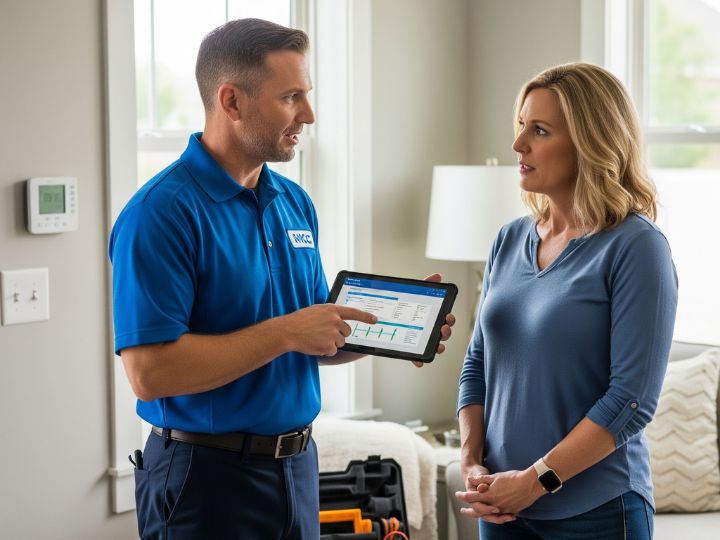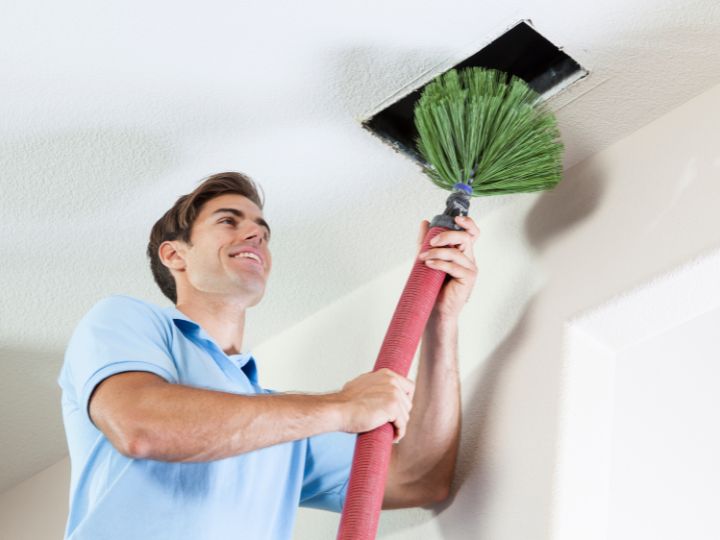Table of Contents
To reduce electricity usage with better HVAC care, prioritize regular filter changes, seal ductwork, schedule professional maintenance, and install a smart thermostat. These steps improve system efficiency, lower utility bills, and extend the lifespan of your equipment.
Key Takeaways:
- Replace or clean air filters regularly
- Seal and insulate ductwork
- Schedule bi-annual professional HVAC inspections
- Use a smart thermostat for automated efficiency
Cutting energy consumption not only saves money but also reduces your environmental impact and enhances your indoor comfort. At the heart of this effort is effective HVAC maintenance. Below, we outline proven strategies for reducing electricity use while maintaining a healthy, comfortable home environment.
Understand the Connection Between HVAC Efficiency and Energy Bills

HVAC maintenance for energy efficiency is essential in reducing high electricity bills. Heating and cooling systems can use up to 60% of a home’s energy, making them major contributors to overall consumption. When HVAC units are neglected, they become inefficient and consume more power to maintain comfort. Regular maintenance ensures optimal performance, allowing the system to run smoothly with less energy. By keeping components clean and well-tuned, homeowners can enjoy consistent indoor temperatures while saving significantly on utility costs.
Schedule Regular HVAC System Inspections
Routine professional inspections are essential for peak performance and reduced energy waste. Certified HVAC technicians perform vital tasks such as:
- Cleaning coils to improve heat transfer
- Checking refrigerant levels to avoid overloading the compressor
- Calibrating thermostats for accurate control
- Lubricating moving parts to reduce resistance
- Inspecting ductwork for blockages or air leaks
📅 Tip: Schedule inspections twice a year, ideally in spring and fall, to prepare for seasonal extremes.
Change Air Filters Frequently
Dirty or clogged filters restrict airflow, forcing your HVAC system to work harder and consume more electricity. This simple maintenance task can yield big savings.
✅ Best Practices:
- Replace filters every 1–3 months
- Use HEPA filters for improved indoor air quality
- Set a recurring reminder or use a filter subscription service
Seal and Insulate Ductwork
Leaky ducts can reduce HVAC efficiency by up to 30%, resulting in energy loss and uneven indoor temperatures.
🛠️ Duct Sealing Tips:
- Inspect for visible cracks or disconnections
- Use mastic sealant or UL-approved metal tape
- Insulate ducts in attics, basements, or crawlspaces
Properly sealed and insulated ducts ensure that conditioned air reaches its destination without energy loss.
Upgrade to a Smart Thermostat
Smart thermostats help optimize energy usage by learning your routines and automatically adjusting settings to save power.
📱 Benefits Include:
- Remote control via mobile app
- Real-time energy usage reports
- Geofencing and schedule learning
Savings of 10–15% on HVAC energy use
Use Zoning Systems for Targeted Comfort
HVAC zoning lets you control temperatures in different areas of your home independently, reducing unnecessary energy use.
🧭 Each zone includes:
- Its own thermostat
- Dampers in ductwork for control
- A master system for coordination
Zoning is particularly effective for multi-story homes or homes with variable occupancy.
Install Energy-Efficient HVAC Equipment
If your system is over 10–15 years old, upgrading to an ENERGY STAR®-rated HVAC unit can significantly reduce electricity usage.
⚙️ Look for features like:
- High SEER ratings (16 or above)
- Variable-speed motors and compressors
- Dual-stage cooling/heating
Though the upfront cost may be higher, you’ll benefit from long-term savings, rebates, and improved reliability.
Maintain Clean Outdoor Units
The outdoor condenser unit is critical to system performance. Keep it clean to ensure optimal airflow and energy efficiency.
🌿 Outdoor Maintenance Tips:
- Clear debris, leaves, and grass regularly
- Maintain 2+ feet of clearance
- Use low-pressure water to clean coils
- Schedule professional coil cleanings annually
Optimize Home Insulation and Ventilation
A well-insulated and ventilated home reduces the strain on your HVAC system, directly lowering energy usage.
🏠 Energy Efficiency Upgrades:
- Upgrade attic insulation
- Seal windows and doors
- Use weatherstripping and caulk
- Add ventilation fans in attics
- Install blackout curtains or window films
These steps help regulate indoor temperatures more efficiently.
Use Ceiling Fans to Complement HVAC
Ceiling fans promote even airflow and allow you to adjust thermostat settings without sacrificing comfort.
🌀 In summer: Set fans counterclockwise to push cool air down
🔥 In winter: Reverse direction to distribute warm air
You can raise your thermostat by 2–4°F in summer with proper fan use—cutting electricity usage in the process.
Perform Professional Energy Audits
A home energy audit offers a comprehensive analysis of your HVAC efficiency and overall energy use.
🔍 Energy Auditors Use Tools Like:
- Thermal imaging for insulation gaps
- Blower door tests for air leaks
- Watt meters to measure power draw
The audit will pinpoint exactly where you can improve HVAC performance and cut costs.
Educate Occupants on Efficient HVAC Use
Even the best HVAC system can be undermined by bad habits. Promote smarter energy use through household guidelines.
📘 Simple Behavioral Tips:
- Set thermostats to 78°F in summer and 68°F in winter, as advised by the U.S. Department of Energy
- Close vents in unused rooms
- Avoid constant thermostat changes
- Align HVAC usage with your routine
Over time, these habits lead to consistent electricity savings.
Utilize Preventive Maintenance Plans
Many HVAC providers offer preventive HVAC maintenance plans, ensuring your system runs smoothly all year long.
🛠️ Plan Benefits Include:
- Bi-annual tune-ups
- Priority service during peak seasons
- Discounts on parts and repairs
Investing in a plan is a smart, proactive way to prevent inefficiency and reduce energy waste.
Trust the Experts at HVAC Alliance Experts
While DIY maintenance is valuable, professional expertise ensures thorough, precise care. At HVAC Alliance Expert, we provide:
- Reliable heating maintenance and AC repair
- Indoor air quality solutions
- Air duct cleaning
- Emergency services
Our licensed HVAC technicians are committed to helping homeowners cut electricity costs, boost comfort, and extend the life of their systems.
📞 Contact us today to schedule a comprehensive system tune-up and experience expert HVAC care you can trust.
Conclusion

Reducing electricity usage with better HVAC care isn’t just smart—it’s essential. Simple yet impactful measures like changing filters, sealing ducts, using smart thermostats, and scheduling inspections offer immediate and long-term savings. These strategies improve comfort, reduce wear and tear, and create a more energy-efficient home.
For best results, pair your personal efforts with trusted HVAC service professionals. Regular HVAC maintenance, equipment upgrades, and expert diagnostics ensure your system operates at peak performance year-round. With HVAC Alliance Expert by your side, you’ll enjoy lasting comfort, lower bills, and reduced energy consumption.
FAQs
It’s recommended to schedule professional HVAC maintenance at least twice a year—once in the spring for cooling and once in the fall for heating. Regular maintenance helps ensure peak efficiency and can prevent costly repairs.
Yes, clean air filters improve airflow, reducing strain on your HVAC system and lowering energy consumption. Replacing filters every 1–3 months can lead to noticeable savings on utility bills.
Smart thermostats learn your preferences and adjust temperatures automatically to save energy. They can reduce HVAC-related electricity usage by up to 15% annually.
Absolutely—leaky ducts can waste up to 30% of conditioned air, forcing your system to work harder. Properly sealed and insulated ductwork ensures efficient airflow and reduces power usage.
If your system is more than 10–15 years old or requires frequent repairs, it may be time for an upgrade. New energy-efficient models offer better performance and can significantly cut electricity costs over time.


